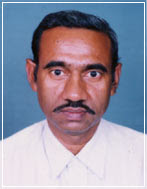“प्रक्रियासर्वस्वम्”
के रचयिता नारायणभट्ट और उनका काव्य “निरनुनासिक”
It has come down to us in Malabar through
tradition that नारायण was a very lazy young man of irregular life; one day early
morning when he was leaving his room, one अच्युत पिसारोटि was teaching a disciple how to
calculate the positions of the Sun and the Moon in relation to the Nakshatras.
He was trying to find a chronogram for the Kali data and नारायण immediately gave the very awkward
notation लिंगव्याधिरसह्या, which will be 1729133. Evidently, this must be wrong in
so far as this date is 5932 days after the date given in the प्रक्रियासर्वस्वम्. The tradition goes that the aged पिसारोटि was disgusted with the young
Brahmin and scolded him for his un-Brahmanical life and that नारायण was pained and decided to take to
study under पिसारोटि and soon learned all the Shastras. The date given in the
tradition disproves the tradition entirely. There are various stories about
him. But they are all mere stories and only prove that he was an extraordinary
man of the time, who, on account of his firm devotion to कृष्ण, was endowed with even an element
of divine purity. Some stories may not be uninteresting. When he first went to
Ampalapuza, he was sitting in the temple and the King was informed of the
arrival of a new learned Brahmin and he remarked, "I do not know if he can
read correctly". The expression for "reading correctly in Malayalam
is "കൂട്ടി
വായിക്കുക" (कूट्टि वायिक्कुक) and this may also mean, "read adding up new
matter." नारायण heard about this remark. In the afternoon, he was invited
to the Palace to read and explain Puranas. He read a passage thus:
भीमसेनगदात्रस्ता
दुर्योधनवरूधिनी ।
शिखा
खार्वाटेकस्येव कर्णमूलमुपागता ॥
The army of Duryodhana, frightened by the club of
Bhlmasena, approached कर्ण (the Hero or the ear), like the hair on the head of a bald
man. The King asked him if that verse was in the text and he said that he
wanted to show him how to "കൂട്ടി വായിക്കുക" (कूट्टि
वायिक्कुक) that is,
"to read correctly" or "to read adding new matter." The
joke lay in the fact that, according to tradition, that King was a bald man.
From that time, he became a favourite of the King. In his Court, he composed
the प्रक्रियासर्वस्वम् and also a large number of चम्पूs. The usual practice was for him to
write a चम्पू in the forenoon and the चाक्यर was to explain it in the
afternoon. One of his चम्पूs is निरनुनासिक, in which शूर्पणखा complains, after her being deformed
by लक्ष्मण, to रावण; being devoid of her nose she
could not pronounce nasal sounds and so the whole चम्पू is composed without a nasal sound.
The first verse has the passage:
हा
हा राक्षसराज दुष्परिभवग्रस्तस्य धिक् ते भुजाः ।
Here the word भुजा is either masculine or feminine
and if he used the second case of it in the masculine plural, there will be a
nasal in भुजान् and so he used the feminine form भुजाः. When the चाक्यर explained the passage in the
afternoon, he explained it as "I condemn your twenty hands devoid of
masculinity". Both the King and. the author were very much p!eased. There
are various stories current in Malabar about these two geniuses in the Court of
the King of AmpaIapuza. I narrate only two, which are the most interesting.
[संदर्भ - चि. कुञ्ञन्राज (C.
Kunhan Raja) द्वारा सम्पादित
नारायणभट्टविरचितम् "प्रक्रियासर्वस्वम् (तद्धित प्रकरणम्)", INTRODUCTION, पृ॰ xxviii-xxx; मद्रास विश्वविद्यालय, 1941.]
